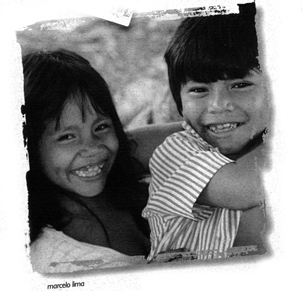 |
Interdisciplinary
Journal on Human Development, Culture and Education
Revista Interdisciplinar de Desenvolvimento Humano, Cultura e Educação
ISSN: 1533-6476 |
|
| Tikuna
kids /
Crianças Tikuna Aldeia Filadelfia BenjaminConstant, Amazonas, Brasil photo (c) Marcelo Lima Editorial
policy /
Review
Essays /
Notas
de Leitura
Books
received /
Vol I : Sign
our /
Leia
o nosso /
READER'S
FORUM
|
RESENHAS
/ BOOK REVIEWS
Dezembro / December 2000 Fishman, Joshua, editor Handbook of Language and Ethnic Identity New York and Oxford:
Oxford University Press, 1999, 468 pages
In the best tradition of the manual or handbook (as the name indicates: a book to be handled, manipulated, "carried around", consulted again and again) the Handbook of Language and Ethnic Identity, explores a pluridisciplinary approach to the relationships between language and ethnicity. And although the book was designed with the general reader and the student, beginner researcher, in mind, it can, I believe, be read with interest and profit also by the specialists. As an introductory and survey volume, the initial merit of the Handbook is the fact that it does not insult the intelligence of its readers , it does not mutilate the complexity of issues and approaches in the name of readability or "instantaneous comprehension", as unfortunately, given the conditions of Higher Education in America today, a large number of the didactic and paradidactic books published in the US do. From economics to anthropology, and including disciplines such as Education, History, Political Science, Psychology, etc, the vicinity of various humanistic and sociological disciplines between the covers of a single volume may indeed encourage the reader to generate his / her own cross references and interdisciplinary synthesis towards the understanding of the role of language in the production of ethnicity itself and the ethnic dimensions of linguistic phenomena. The editor himself is an internationally recognized authority in the field of Sociolinguistic, a discipline he defines as inhabiting the “boundaries” between Linguistics and Sociology. The science of Linguistics was once in the 20th Century understood and practiced mostly as a formal, or rather formalistic, discipline whose aim was mainly to disclose the inner “logic”, or inner structure, of language. A science whose object, that is, language itself, was considered, under the dominant epistemological models of the time, essentially as a sort of “logical” entity. The intellectual, social and ideological context in the latter part of the Century, in turn, characterized as one of “ethnic revival” (editor’s term) and , therefore, of cultural awareness, is marked to a great extent by anthropological perspectives and models in the humanistic fields and in the Social Sciences. What impact does the contributions of the “dual” field of Sociolinguistic and pluridisciplinary or interdisciplinary approaches, such as the ones briefly exemplified in this book, have today, or will have in the future, to the core discipline of Linguistics itself (granted the different object of structural linguistic analysis) is a question that may come to mind for the reader of the present work. The present volume is structured not only in terms of disciplinary convergences and distinctions, but also by a concern with regional aspects and an intent to build a truly international effort to cover the phenomenon of linguistic plurality and ethnic experience in a world more and more affected by the processes (plural intended) of economic and cultural globalization. An effort, we can point out, here mediated by the English language (the language of the book) and by the “lived” realities of the socially and ideologically constructed linguistic identities of the various writers, many themselves bilingual or multilingual individuals exemplifying at different levels, through their different disciplinary and methodological approaches, through their various uses of the English language, the conscious, unconscious, spontaneous, strategic, scientific, ideological, dialogical, monological, structural and infra structural, semiotic, historical and differential realities of the speaking / writing subject today. Marcelo G Lima
updated
6 outubro / october / 2001
copyright
(c) 2001 Centro de Estudos e Pesquisas Armando de Oliveira
Souza CEPAOS
return
to CEPAOS Review Homepage
endereço
telefone
+ fax: (55) 11 - 50837182 Brasil
|
